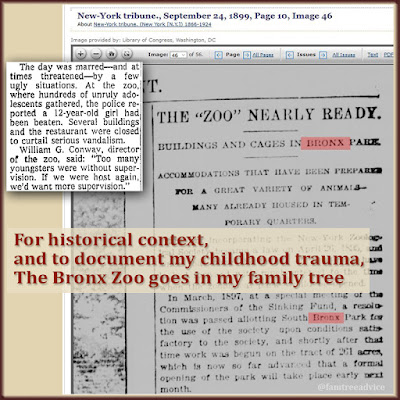Build your DNA match's family tree until you find the true relationship.
This article took a sharp turn from where it started. I thought I discovered an easy way to figure out your connection to a confusing DNA match.
And it is a good method. But then I realized the confusing DNA match I was looking at didn't have a direct line to me. It took a marriage to make the connection. Her 1st cousin 2x removed married my 4th cousin 3x removed.
And maybe that's where our shared DNA comes from.
Click Your Way to a Common Ancestor
Here's what I found. While it didn't work on this DNA match, it did reveal a blood relationship between my great aunt and her husband.
Originally I thought my DNA match was directly related to my great aunt's husband Donato. To see if Donato had a blood relationship to me (not just an in-law relationship), I went to Family Tree Maker. The software displays your relationship to the selected person clearly.
- I clicked Donato's parents one at a time to see their relationship to me.
- His mother Colomba is my 4th cousin 3x removed. A blood relative.
- I clicked Colomba's parents to see their relationship to me. Her mother Maria is my 3rd cousin 4x removed.
- I clicked Maria's parents to see the relationship description. Her father Vitangelo is my 2nd cousin 5x removed.
- I clicked Vitangelo's parents. His father Pietro is my 1st cousin 6x removed.
- Pietro's father Vitangelo is my 6th great uncle.
- Finally, Vitangelo's parents are my 6th great grandparents, Liberatore Pozzuto and Libera Zeolla.
My 6th great grandparents are both Donato's and my great aunt's 4th great grandparents. With a shared pair of 4th great grandparents, my aunt and uncle were 5th cousins.
 |
| Are unknown relationships hiding in plain sight in your family tree? |
Follow the Evidence
You're going to find that many of your DNA matches have posted a small, sparse family tree. (That's better than the matches with no tree.) Use their tree as a guideline only. Do the research yourself and try to prove what you see in their family tree.
This particular DNA match caught my attention recently. She was borrowing names and documents from my family tree and a distant relative's tree. I wanted to figure out who she is. Her tree on Ancestry.com seems to be facts she knows personally:
- her parents' names and birth dates
- her grandparents names and birth dates
- as many siblings as she knows for her parents and grandparents
Her family names tell me we're related through my paternal grandfather's hometown. Ancestry says she's about a 3rd or 4th cousin to my father and a 4th to 6th cousin to me.
Believe Nothing Without Proof
I wrote down her parents', grandparents', and great grandparents' names. Only a few had birth years included.
Then I opened my collection of vital records from my grandpa's hometown. Her parents were born too recently for my document collection, so I searched for their parents.
Bit by bit I added verified names and dates to my tree. I attached birth and marriage records as evidence. No one had a direct connection to me yet. But something had to be there.
When I found the 1866 birth record of my DNA match's mother's father's mother, a funny thing happened. The parents happened to be a couple I'd added to my family tree the day before!
Coincidentally, Libera and Giovanni are the parents of my DNA match's great grandmother. Now my DNA match was firmly rooted in my family tree. But it's one of those wacky "1st cousin 2x removed of wife of uncle of husband of 1st great aunt of" me relationships.
I thought we were related through the marriage of my great aunt and uncle. That's why I examined Donato's direct ancestors and found he was his wife's 5th cousin.
 |
| If that DNA match is distant, you're gonna need a bigger tree. |
Always Look for More
Oh, these small Italian hill towns. They're infuriating and amazing at the same time. Everyone is related in some way. Donato, who married my great aunt, is related to me in his own right.
Family Tree Maker's relationship tool says Giovannangela, my grandfather's sister, is all these things to her husband Donato:
- wife
- 1st cousin of his brother-in-law, Pietro Iamarino
- sister-in-law of his 1st cousin 1x removed, Donato Paolucci
- 5th cousin
Actually, Family Tree Maker isn't displaying the 5th cousin relationship. It's as if it's throwing up its hands and saying "whatever".
Now that I've figured out how to follow the blood relationship, I can revisit more DNA mysteries. But be warned! It's easy to get lost. You may find you can't wrap your head around it. It helps to take notes along the way.
Can you find your DNA match's connection by climbing their family tree?


![I get angry when my seat on an airplane is too cramped. My poor ancestors rode in the belly of one of these. I get angry when my seat on an airplane is too cramped. My poor ancestors rode in the belly of one of these. ... Ancestry.com. New York Port, Ship Images, 1851-1891 [database online]. Provo, Utah: MyFamily.com, Inc., 2004. Original data: Ship images obtained from and reproduced courtesy of Mystic Seaport.](https://blogger.googleusercontent.com/img/b/R29vZ2xl/AVvXsEjrXM3ChMWg4WfEZpcqoi05bTQd5lSKLcseicXO345jpmMZtVS31qAIUhNTbnAtbVVq9dklCiSuDbwH3L1pBupNXfJikq8kpIdxw71_KKUd_7g0solx2WMTs8j28SLvIfNGzku04s_40Eg/w400-h301/073019-ship.jpg)

